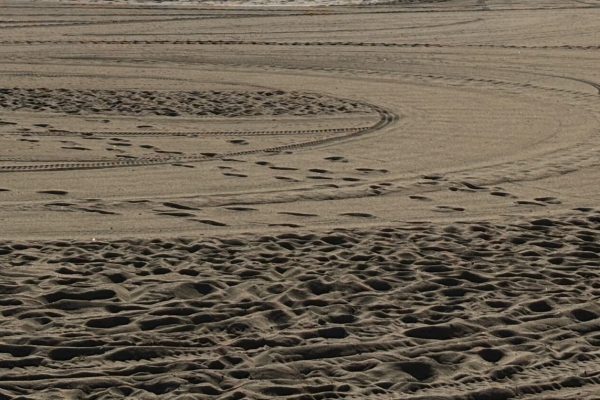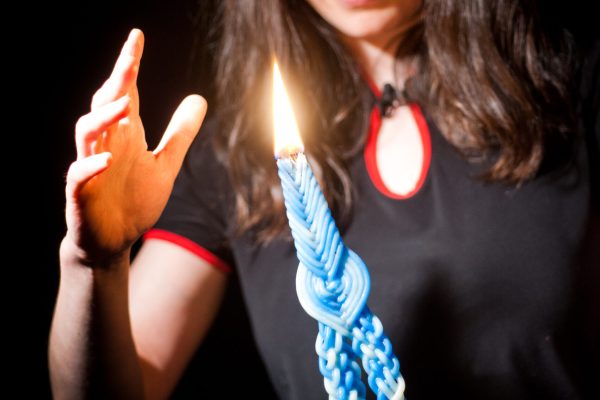Sometimes we may feel painfully alone. This may be as a result of a change, loss, grief, or a particularly challenging time. You may find yourself in such a transition, not knowing what will be next. This can certainly create anxiety and fear of the unknown. Jewish tradition teaches us that even in the darkest of times we are never fully alone. We always have the ear of the divine presence.
Rebbe Nachman of Breslov taught us about the practice of התבודדות (hitbodedut), going into one’s inner thoughts to offer a spontaneous prayer to G-d. The practice is to talk to G-d as you would a close friend, sharing whatever is on your mind. Rebbe Nachman stated that the best time and place to pour out one’s heart was in the middle of the night amidst nature in a field or forest. The reason for this was to free oneself from the excitement and noise of everyday human activity. The idea of seclusion and quietness might allow us to be most present with the desires and fears within our own hearts.
The book of Psalms also offers examples of hitbodedut, personal prayers. Many of the psalmists wrote prayers from their inner hearts, some during times of joy and others in times of despair. Another way to engage with the Jewish practice of hitbodedut is in reading and connecting with the prayers the psalmists were creating and offering in their own time.
Do this ritual yourself:
-
Find a quiet space where you can be calm and present (it doesn’t have to be the middle of the night in a forest; that sounds dangerous!)
-
Allow yourself to share what comes from your heart either spoken aloud, on paper, or in your mind. This is from your own unique voice, using language that is most comfortable to you.
-
Congratulate yourself for participating in an ancient Jewish ritual (and thank G-d for listening, if that’s your thing)!
For my own practice, Psalm 28 resonated with me about this feeling of being in unknown times. Below is my translation of the Psalm along with my own hitbodedut, a prayer for times unknown.
|
(1) (A Psalm) Of David. Hashem, I call to You; my rock, do not be silent from me, for if You fall silent from me, I shall be like those who’ve gone down into the Pit. (2) Listen to my plea of desperation when I cry out to You, when I lift my hands toward Your inner sanctuary/holiness. (3) Do not count me with the evil ones and workers of wicked ways who profess peace toward their neighbors while iniquity is within their hearts. (4) (Hashem) Give to them the same as their actions, their acts of malice; pay them according to the work of their hands, remunerate them in kind. (5) For they do not understand Hashem’s achievements, the work of His hands. May He destroy them, never to rebuild them! (6) Blessed is Hashem, for He listens to my plea of desperation. (7) Hashem is my strength and my shield; my heart relies on Hashem. I was helped, and my heart was glad, so I will glorify Hashem with my song. (8) Hashem is their strength; He is a refuge and salvation for them. (9) Deliver and bless Your people, your inheritance (Hashem); gather them and carry them eternally. |
(א) לְדָוִ֡ד אֵ֘לֶ֤יךָ יְהוָ֨ה ׀ אֶקְרָ֗א צוּרִי֮ אַֽל־תֶּחֱרַ֪שׁ מִ֫מֶּ֥נִּי פֶּן־תֶּֽחֱשֶׁ֥ה מִמֶּ֑נִּי וְ֝נִמְשַׁ֗לְתִּי עִם־י֥וֹרְדֵי בֽוֹר׃ (ב) שְׁמַ֤ע ק֣וֹל תַּ֭חֲנוּנַי בְּשַׁוְּעִ֣י אֵלֶ֑יךָ בְּנָשְׂאִ֥י יָ֝דַ֗י אֶל־דְּבִ֥יר קָדְשֶֽׁךָ׃ (ג) אַל־תִּמְשְׁכֵ֣נִי עִם־רְשָׁעִים֮ וְעִם־פֹּ֪עֲלֵ֫י אָ֥וֶן דֹּבְרֵ֣י שָׁ֭לוֹם עִם־רֵֽעֵיהֶ֑ם וְ֝רָעָ֗ה בִּלְבָבָֽם׃ (ד) תֶּן־לָהֶ֣ם כְּפָעֳלָם֮ וּכְרֹ֪עַ מַֽעַלְלֵ֫יהֶ֥ם כְּמַעֲשֵׂ֣ה יְ֭דֵיהֶם תֵּ֣ן לָהֶ֑ם הָשֵׁ֖ב גְּמוּלָ֣ם לָהֶֽם׃ (ה) כִּ֤י לֹ֤א יָבִ֡ינוּ אֶל־פְּעֻלֹּ֣ת יְ֭הוָה וְאֶל־מַעֲשֵׂ֣ה יָדָ֑יו יֶ֝הֶרְסֵ֗ם וְלֹ֣א יִבְנֵֽם׃ (ו) בָּר֥וּךְ יְהוָ֑ה כִּי־שָׁ֝מַע ק֣וֹל תַּחֲנוּנָֽי׃ (ז) יְהוָ֤ה ׀ עֻזִּ֥י וּמָגִנִּי֮ בּ֤וֹ בָטַ֥ח לִבִּ֗י וְֽנֶ֫עֱזָ֥רְתִּי וַיַּעֲלֹ֥ז לִבִּ֑י וּֽמִשִּׁירִ֥י אֲהוֹדֶֽנּוּ׃ (ח) יְהוָ֥ה עֹֽז־לָ֑מוֹ וּמָ֘ע֤וֹז יְשׁוּע֖וֹת מְשִׁיח֣וֹ הֽוּא׃ (ט) הוֹשִׁ֤יעָה ׀ אֶת־עַמֶּ֗ךָ וּבָרֵ֥ךְ אֶת־נַחֲלָתֶ֑ךָ וּֽרְעֵ֥ם וְ֝נַשְּׂאֵ֗ם עַד־הָעוֹלָֽם׃ |
My own prayer for times unknown:
G-d, I know that you are listening. I know you are here with me; or at least that is what I believe. There is so much work to be done in our country and in our world. I often don’t know where to start; it all feels so overwhelming. Everyday becomes a struggle. Just getting my family ready to leave the house in the morning could be an act of defiance alone. But I want to do more. I want to be a part of making sure all feel loved and cared for. I want this country to be one in which equality of all people is not disputed. I want everyone to be treated equally. Is that really too much to ask? I believe in your ability to provide peace and protection for those you care about. I hope that in people’s darkest moments you will not be silent. I hope that you will show your kindness and care by providing helpful neighbors and building strong communities. How have we gotten to this point of division amongst people? I want to believe in your guidance and in your ability to connect people. Help me to see the goodness in others. Help me to understand those who think differently than me. Allow me to listen and strive for connection in places that feel divided. I hope you hear this request of faith. And I hope you respond in a way that makes the world feel just.











